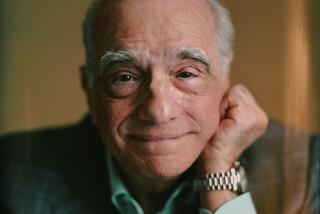‘Margaret’ to launch after 6 years
- Share via
“Margaret,” a film arriving in theaters Friday, has a strong Hollywood pedigree: It boasts appealing stars in Matt Damon and Anna Paquin, an Oscar-nominated director (Kenneth Lonergan of “You Can Count on Me”) and a triumvirate of celebrated producers (Scott Rudin as well as the late Anthony Minghella and Sydney Pollack).
Moviegoers might wonder, then, why there has been almost no publicity for the $14-million production. But once they start watching the 21/2-hour film, they may pick up on some clues.
In one scene, a theater is playing “Serenity,” which opened Sept. 30, 2005. Damon and Paquin look surprisingly young. New York magazine film critic David Edelstein, after praising the film’s opening half, said that its “last hour is a fiasco, full of mismatched shots, subplots from nowhere, and 360-degree pans that make you want to ship the director to film school.”
It’s not uncommon for movies to sit on the shelf -- for instance, Renee Zellwegger’s “Case 39” came out last year, four years after it was shot, and Eddie Murphy’s “A Thousand Words” was filmed in 2008 and is yet to arrive in U.S. theaters. Sometimes a corporate hang-up, like a bankruptcy filing or change of executives, delays things. Other times, creative differences result in gridlock.
“Margaret’s” six-year journey to the screen, though, was unusual not only for its duration but for the number of high-profile people involved, including director Martin Scorsese and actor Matthew Broderick.
The production spawned three lawsuits among financier Gary Gilbert, distributor Fox Searchlight and Lonergan.
Executives from Fox Searchlight refused this week to discuss why it took so long to bring “Margaret” to screens. “Although the film has had a long journey from filming to completion,” the studio said in a statement, “we are looking forward to getting the film out to audiences.”
The studio is releasing the movie in one theater in New York and one in Los Angeles this weekend, and says it plans for limited runs in 12 other cities.
Court records and interviews with people involved in the production over the years, though, paint a picture of a movie whose troubles began during filming and escalated afterward.
Gilbert, who most recently co-financed “The Kids Are All Right,” said in court documents that within the first week of shooting “Margaret” in New York in September 2005, the production was going off the rails. The film’s line producer was fired and replaced, Gilbert said in one court filing, and the budget was raised by $2.4 million.
After filming ended in late 2005, Gilbert said in legal documents, he granted the filmmaker “approximately 16” separate post- production extensions but Lonergan was unable to finish editing the movie.
Mathew Rosengart, an attorney for Lonergan, declined to be interviewed this week. But in a legal filing two years ago, he said Lonergan and his company “deny generally and specifically each and every allegation” made by Gilbert.
Court documents and interviews indicate that Rudin, Pollack (who died in 2008) and Scorsese’s longtime editor, Thelma Schoonmaker, tried but failed to help Lonergan complete the film. Rudin didn’t return calls for comment.
Sources close to the film say Lonergan borrowed money from Broderick, who has a small part in “Margaret” and starred in Lonergan’s play “The Starry Messenger,” to finish the film.
“The business is so crazy. It’s an art form and a business, and we’re trying to mix oil and water all the time,” said Michael Harper, senior vice president of postproduction for International Film Guarantors, the insurance company charged with making sure “Margaret” was finished and delivered on schedule and within budget.
When Lonergan ran out of money, Gilbert chipped in his own funds to keep the edit bay running, Harper said. Eventually, Lonergan let Gilbert bring in his own editor, Dylan Tichenor, who made a two-hour version, Harper said. But when Fox Searchlight ran out of patience and demanded delivery of the film in June 2008, Harper said, Lonergan didn’t hand over Tichenor’s version; he provided his own.
“Every cut on the movie was done by Ken,” Harper said. “Gilbert wanted his cut, which was well under the 21/2 hours. He thought it was far better.”
A month after it received the film, Searchlight sued Gilbert, alleging that he had failed to pay his share of the film’s production budget -- about $6.2 million. Gilbert countersued Searchlight for breach of contract and separately sued Lonergan. (Gilbert and Searchlight recently settled; terms were confidential.) Gilbert’s case against Lonergan is scheduled for trial early next year.
Gilbert, asked to comment this week, issued a statement that said, “Ever since we settled our litigation several years ago, Searchlight and I have been on the same page, working together on the release of the film.”
The legal battles, coupled with attempts to achieve some creative consensus among the various parties, kept the film in limbo for the next three years.
One of the most intriguing elements in the “Margaret” saga is the involvement of Scorsese, who acted as a mentor to Lonergan. Scorsese served as executive producer on Lonergan’s directorial debut, “You Can Count on Me,” in 2000, and Lonergan co-wrote the screenplay for Scorsese’s 2002 “Gangs of New York.”
According to the three people familiar with the situation who asked not to be identified because of the pending litigation, Scorsese saw an early cut of Lonergan’s film, one that ran 2 hours and 50 minutes. He knew of Lonergan’s troubles editing it and agreed to cut a new version. (Under terms of the initial agreements, “Margaret” couldn’t be longer than 2 hours, 30 minutes.)
Those people said Scorsese worked on his cut of “Margaret” in May and June of this year, even as he was finishing his feature film “Hugo” and an HBO documentary on George Harrison, as well as working on the HBO series “Boardwalk Empire,” on which he is a producer.
Some say Scorsese’s cut of “Margaret” was strong (though it was longer than 2 hours, 30 minutes) and the idea was floated to give him an executive producer credit and add “Martin Scorsese presents...” above the film’s title. Others, though, said his version didn’t differ enough to merit the extra money it would have required to finish it.
Lonergan issued a statement Thursday asserting that Searchlight offered to send the Scorsese cut to the Toronto International Film Festival, but that “regrettably Mr. Gilbert declined to provide his written approval.”
Searchlight declined to confirm that. Gilbert called Lonergan’s statement “completely false.”
--
nicole.sperling@latimes.com
More to Read
Only good movies
Get the Indie Focus newsletter, Mark Olsen's weekly guide to the world of cinema.
You may occasionally receive promotional content from the Los Angeles Times.










